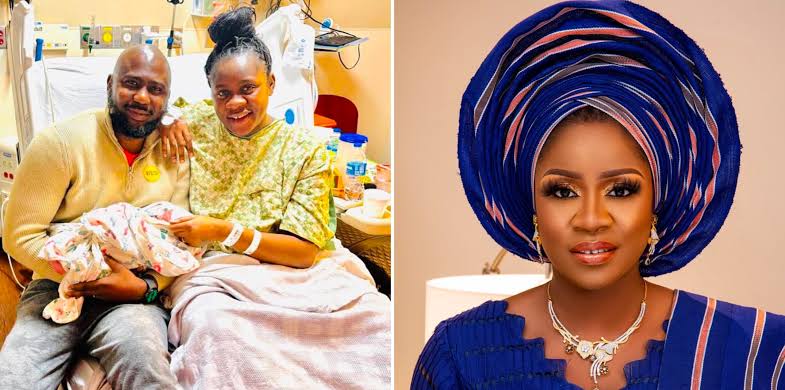Olayinka Solomon, a prominent figure in the Nigerian Yoruba film industry, known affectionately as Ogo Mushin, has bravely shared her personal journey through the complexities of postpartum experiences. Postpartum, the period following childbirth, is a time of significant physiological and psychological transformation for new mothers. Solomon’s candid revelation provides a valuable glimpse into the often-unseen struggles women face during this delicate period, fostering a sense of community and shared experience among her followers. Her willingness to discuss these challenges contributes to a broader conversation about maternal mental health and the need for support and understanding for new mothers.
Solomon, who welcomed a son with her husband, Olasunkanmi Mabinuori, in January, used her platform on Instagram to connect with other mothers, initiating a dialogue by asking them to share their own postpartum experiences. This open invitation created a space for women to voice their concerns, anxieties, and changes they’ve observed within themselves. Her question sparked a wave of responses, creating a virtual support group where women could find solace and validation in the shared reality of postpartum adjustments. By initiating this conversation, Solomon not only normalized the challenges of postpartum but also provided a platform for women to feel seen and heard in their struggles.
The actress openly discussed her personal struggles, revealing that she has experienced heightened irritability and bouts of memory loss. These symptoms, while common during the postpartum period, are often understated or dismissed. Solomon’s candid admission helps destigmatize these experiences, offering reassurance to other women who may be grappling with similar challenges. Her transparency encourages women to recognize that these symptoms are not indicative of personal failure but are rather a natural consequence of the hormonal and physiological shifts occurring within their bodies after childbirth.
Adding to the emotional and cognitive changes, Solomon also shared her experience with increased appetite, a common postpartum phenomenon. This seemingly minor detail further emphasizes the all-encompassing nature of postpartum changes, affecting not only emotional and mental well-being but also physical sensations and bodily functions. The increased hunger she describes is often attributed to the demands of breastfeeding and the body’s efforts to replenish nutrient stores depleted during pregnancy and childbirth. By openly discussing this aspect of her postpartum experience, Solomon further normalizes the diverse range of changes women undergo during this time.
Olayinka Solomon’s journey through motherhood also reflects the complexities of her personal life. Her current marriage to Olasunkanmi Mabinuori follows a previous marriage to fellow actor Ibrahim Chatta, with whom she shares a son, Malik. That relationship ended amidst allegations of domestic violence, a topic both parties have addressed in various interviews. While the details of her past relationship remain private, her willingness to acknowledge the challenges she has faced underscores her resilience and strength. Her openness about her personal life contributes to her relatability, positioning her not just as a celebrity but as a woman navigating the complexities of life, love, and motherhood.
Olayinka Solomon’s rising star in the Nigerian film industry, particularly within the Yoruba film genre, has been marked by compelling performances in films like “Ogo Mushin” and “Omoge Lekki.” These roles have solidified her position as a talented actress and earned her a dedicated fanbase. Her decision to use her platform to discuss postpartum challenges adds another layer to her public persona, transforming her from simply an entertainer to a relatable figure who uses her influence to address important issues affecting women. Her advocacy for open conversations about postpartum experiences contributes to a larger movement towards destigmatizing maternal mental health and empowering women to seek support during this transformative period. By sharing her own vulnerabilities, she creates a space for others to do the same, fostering a sense of community and shared understanding among her followers and beyond.














